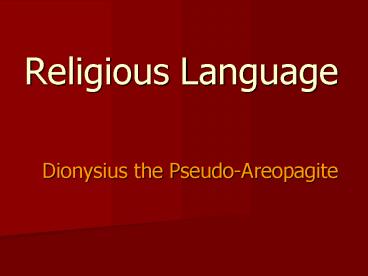Religious Language PowerPoint PPT Presentation
1 / 13
Title: Religious Language
1
Religious Language
- Dionysius the Pseudo-Areopagite
2
Dionysius the Pseudo-Areopagite
- C. 500AD
- Also known as Pseudo-Dionysius
- Wrote several treatises on the theme of how
humans can know and talk about God - Influenced by Plotinus (a Neo-Platonist)
3
Neo-Platonism
- An attempt to combine philosophical ideas
(especially those of Plato) with religion. - Plotinus (205-270AD) claimed that reality is
derived from a single supreme something also
known as the Good or the One. - The One transcends existence and is unknowable.
- The One emanates downwards into a persons soul
and eventually into matter. - It is only by meditating on higher things that
an individual may encounter the One. - This meditation has to be imageless or apophatic
if a valid encounter is to be achieved.
4
- Dionysius is famous for his insistence upon the
absolute and unqualified ineffability of God. He
is as emphatic as it its possible to be, that God
is utterly transcendent , totally ineffable,
indescribable and incapable of being
conceptualised by the human mind. - John Hick The Fifth Dimension 1999
5
Two key texts written by Dionysius
- The Divine Names
- The Mystical Theology
6
In The Divine Names Dionysius points out
- that believers use several names to describe God
- These names are not intended as literal
descriptions - They are pointers towards the fact that God is
the cause of all things - Dionysius argued that is the via negativa, rather
than the via positiva that helps to speak about
God
7
In The Mystical Theology Dionysius argues
- God is beyond and outside all categories of human
thought
8
Dionysius describes three states of knowledge
and meaning in what we can know and say about God
9
The First state the via negativa
- Where we can state what God is not
- e.g. God does not have a body,
- God does not have human features
- God is beyond all knowledge
- Go is beyond all human categories of thought
10
Dionysius says of this supreme cause of all that
it
- is not soul or mind, nor does it possess
imagination, conviction, speech or
understandingIt cannot be spoken of and it
cannot be grasped by understanding. It is not
number or order, greatness or smallness, equality
or inequality, similarity or dissimilarity. It is
not immovable, moving or at restIt does not
live, nor is it life. It is not substance, nor is
it eternity or time. It cannot be grasped by the
understandingIt is neither one nor oneness,
divinity nor goodness. Nor is it spirit, in the
sense in which we understand the term. It is not
sonship or fatherhood, and it is nothing known to
us or to any other beingThere is no speaking of
it nor name nor knowledge of it. Darkness and
light, error and truth it is none of these. It
is beyond assertion and denial. - Dionysius Mystical Truth
11
The second state the state of affirmation
- Having established that God can only be referred
to in non-personal terms, such as the One, the
Source etc and that God is beyond human
understanding - Dionysius asks what can be said about God that
is, what we can say affirmatively (but
inadequately) about what is known of God - This knowledge of God is based on the Bible,
through which Christians gain revelation that God
is loving, God is just etc. However, such
knowledge is within the limitations of human
understanding and is symbolic
12
The third state qualifying what we say about God
- In the third state Dionysius says we should try
to convey that God is beyond human understanding
by qualifying what we say about God by adding God
is beyond the human condition - e.g. God is beyond human goodness
- The metaphorical character of this language leads
people to a greater spiritual awareness
- What can be said about God is known as a
cataphatic statement, as opposed to an apophatic
statement which describes what God is not
13
Criticisms
- In asserting that God is revealed through the
Bible is Dionysius in danger of contradicting the
idea of divine ineffability? (Hick) - Dionysius accepts the Trinity and incarnation of
Jesus as literal truths he does not see these
central Christian claims as symbolic why not? - (NB It may be that Dionysius had a C6th
understanding of the Trinity as a manifestation
of the ineffable deity. (Bernard McGinn argues
that for Dionysius there is a fundamental
distinction between God hidden and revealed)

